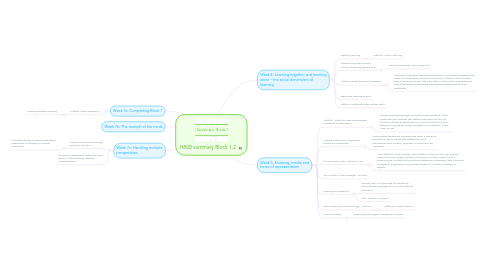
1. Week 7a: Completing Block 1
1.1. Multiple choice questions
1.1.1. Fostering deeper learning
2. Week 7b: The triumph of the nerds
3. Week 7c: Handling multiple perspectives
3.1. Interpersonal action-learning cycle, Zimmer et al
3.1.1. In module deisgn, module presentation, assessment of learning, in module evaluations
3.2. Using the interpersonal action-learning cycle to invite thinking, attentive comprehension.
4. Week 4: Learning together and learning alone – the social dimensions of learning
4.1. Defining learning
4.1.1. What is learning
4.2. Situated cognition and the culture of learning, Brown et al
4.2.1. Authentic learning - see Wenger et al
4.3. Social theories of learning
4.3.1. Learning in this sense takes place over time. It is located in spaces both material (including the virtual) and social and it forms part of a wider array of social practices. This view takes a much more ‘organisational’ view of learning and examines entire activity systems rather than individuals.
4.4. Expansive learning at work
4.5. Partly self-made niches, Pettit
5. Week 5: Knowing, media and forms of representation
5.1. What do media technologies contribute to education?
5.1.1. The grocery truck analogy: The best current evidence is that media are mere vehicles that deliver instruction but do not influence student achievement any more than the truck that delivers our groceries causes changes in our nutrition. (Clark, 1983, p.445)
5.2. Problems with how comparative studies are conducted
5.2.1. Comparative studies are inappropriate when it comes to situations in which substantial differences in the educational aims, context, approach or outcomes are important.
5.3. Of mind and media, Saloman, 1997
5.3.1. What difference does it really make whether a teacher uses, say, pictures instead of words, graphs instead of numbers, or video instead of still photos? Does it make a truly profound difference in learning if text is printed on paper or is glowing on a computer screen, or if video is analogic or digital?
5.4. The medium is the message, McLuhan
5.5. Learning and artefacts
5.5.1. Prensky, 2001 our goal was to completely eliminate any language that even smacked of education
5.5.2. The Machine is using us
5.6. The current wave of technology – Web 2.0
5.6.1. What is Web 2.0
5.7. Further reading
5.7.1. Digital Natives, Digital Immigrants, Prensky
